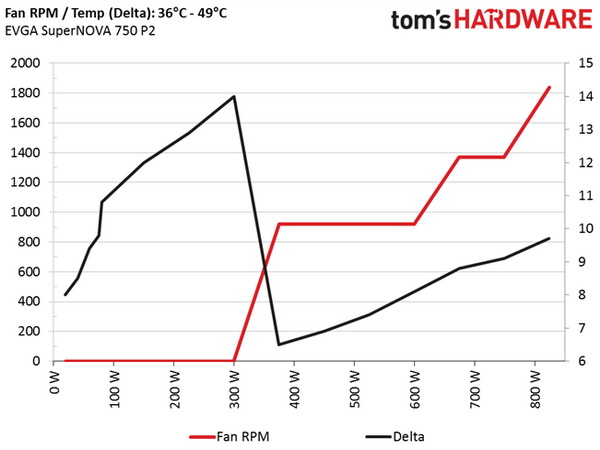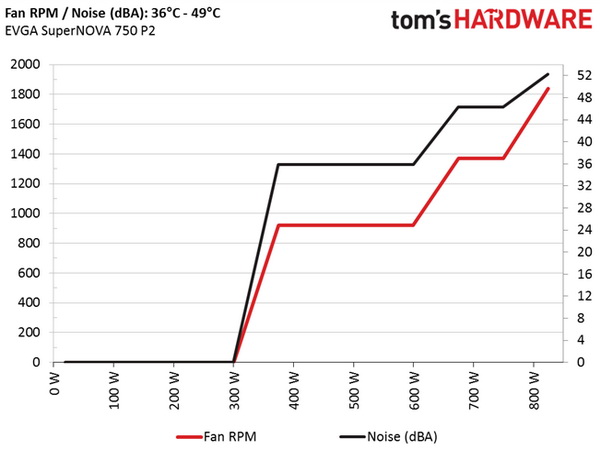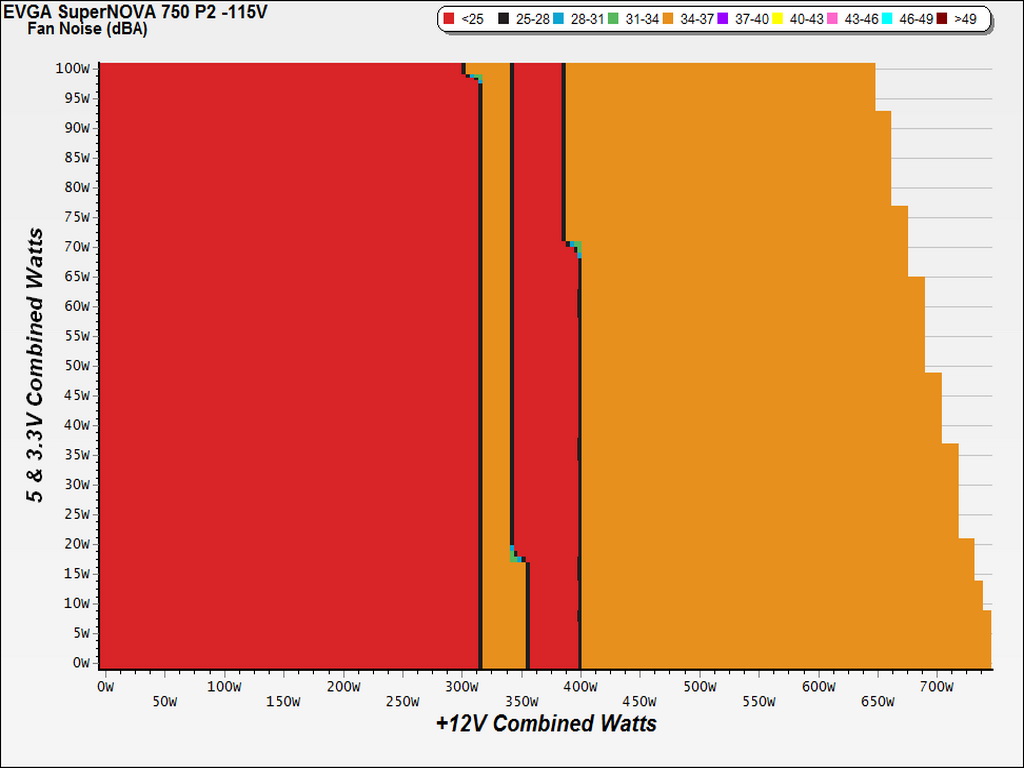EVGA SuperNOVA 750 P2 PSU Review
Another EVGA P2 is on our test bench today. The 750 P2 features 750W max power, modular cabling and Japanese caps throughout. This PSU promises high performance and increased reliability, so it looks to be a great choice for enthusiast PCs.
Why you can trust Tom's Hardware
Efficiency, Temperature And Noise
Efficiency
Our efficiency testing procedure is detailed here.
Using the results from the previous page, we plotted a chart showing the SuperNova 750 P2's efficiency at low loads, and loads from 10 to 110 percent of the PSU's maximum-rated capacity.
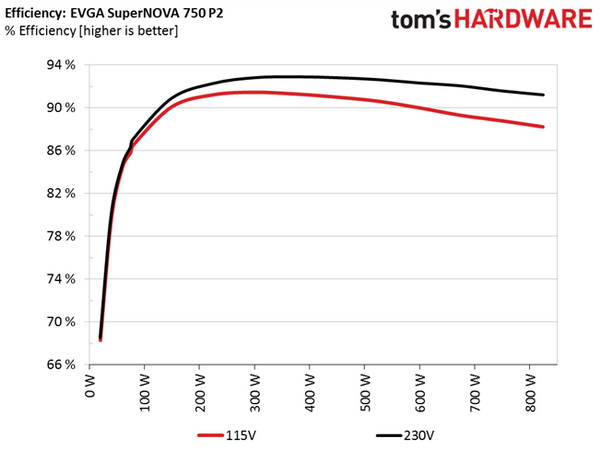
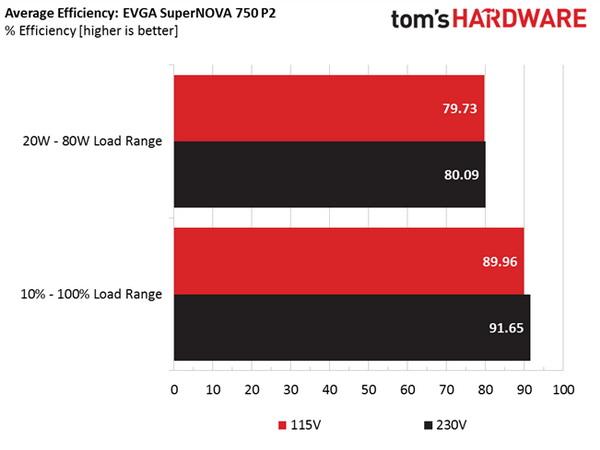
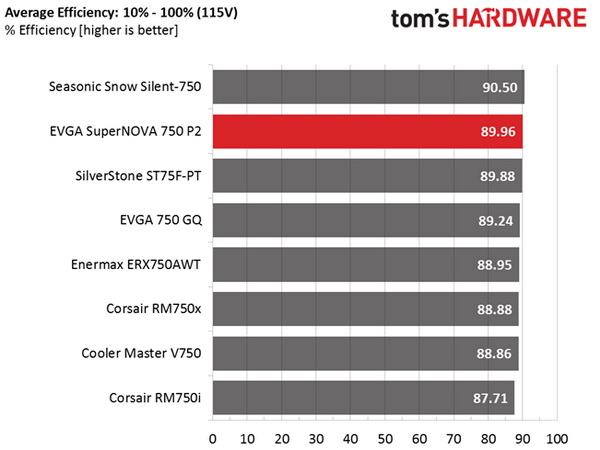
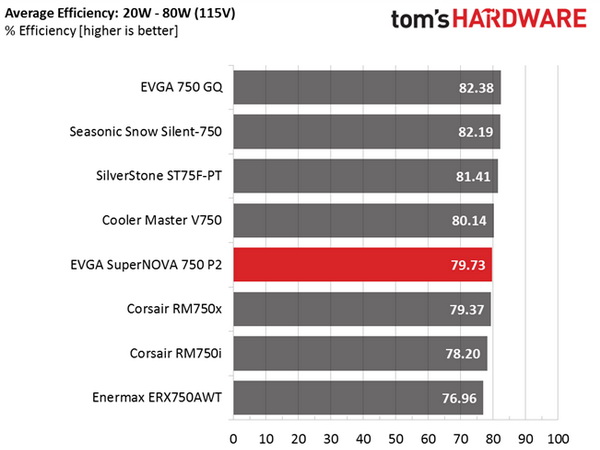
Under normal loads, the 750 P2 loses only to Seasonic's similar-capacity Snow Silent, which is among the best in this wattage category. With light loads, EVGA's offering lands in the middle of the pack. Two Gold-rated PSUs actually pass it (the CM V750 and EVGA 750 GQ).
Efficiency At Low Loads
In the following tests, we measure the efficiency of the EVGA SuperNova 750 P2 at loads significantly lower than 10 percent of the device's maximum capacity (the lowest load the 80 PLUS standard measures). The loads we dialed were 20, 40, 60 and 80W. This is important for representing when a PC is idle, with power-saving features turned on.
| Test | 12V | 5V | 3.3V | 5VSB | DC/AC (Watts) | Efficiency | Fan Speed (RPM) | Fan Noise | PF/ACVolts |
|---|---|---|---|---|---|---|---|---|---|
| 1 | 1.188A | 0.492A | 0.481A | 0.195A | 19.61 | 68.26% | 0 | 0 dB(A) | 0.825 |
| 12.247V | 5.029V | 3.312V | 5.102V | 28.73 | 115.1V | ||||
| 2 | 2.405A | 0.990A | 0.995A | 0.390A | 39.72 | 79.66% | 0 | 0 dB(A) | 0.887 |
| 12.250V | 5.026V | 3.310V | 5.094V | 49.86 | 115.1V | ||||
| 3 | 3.625A | 1.487A | 1.510A | 5.086A | 59.86 | 84.45% | 0 | 0 dB(A) | 0.912 |
| 12.252V | 5.023V | 3.309V | 5.086V | 70.88 | 115.1V | ||||
| 4 | 4.830A | 1.995A | 1.994A | 0.785A | 79.78 | 86.54% | 0 | 0 dB(A) | 0.926 |
| 12.253V | 5.020V | 3.307V | 5.076V | 92.19 | 115.1V |
Under light loads, efficiency isn't as good as we expected. To be more specific, we would like to see a reading over 70% with 20W load and over 80% with 40W.
5VSB Efficiency
The ATX specification states that 5VSB standby supply efficiency should be as high as possible, recommending 50 percent or higher efficiency with 100mA of load, 60 percent or higher with 250mA of load and 70 percent or higher with 1A or more of load.
We take four measurements: one each at 100, 250 and 1000mA, and one with the full load the 5VSB rail can handle.
Get Tom's Hardware's best news and in-depth reviews, straight to your inbox.
| Test # | 5VSB | DC/AC (Watts) | Efficiency | PF/AC Volts |
|---|---|---|---|---|
| 1 | 0.101A | 0.52 | 71.23% | 0.106 |
| 5.106V | 0.73 | 115.2V | ||
| 2 | 0.251A | 1.28 | 76.65% | 0.207 |
| 5.101V | 1.67 | 115.2V | ||
| 3 | 1.002A | 5.08 | 79.01% | 0.366 |
| 5.074V | 6.43 | 115.2V | ||
| 4 | 2.502A | 12.54 | 77.99% | 0.442 |
| 5.011V | 16.08 | 115.1V |
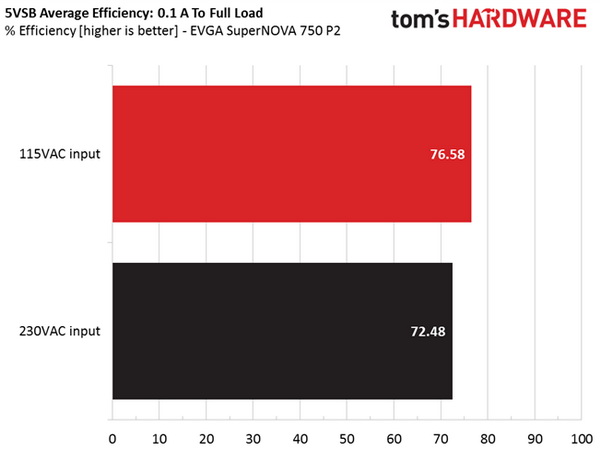
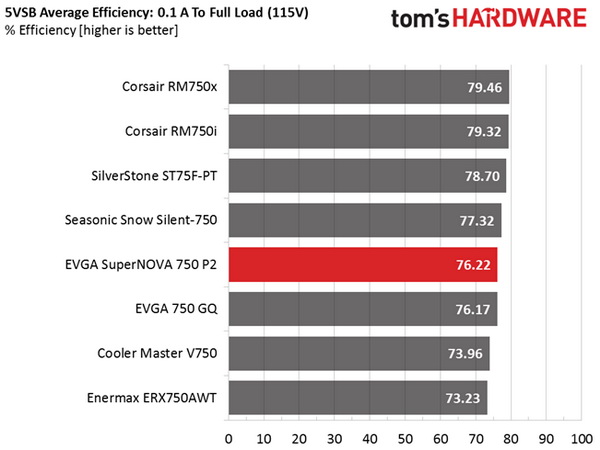
The 5VSB rail achieves decent performance. We would like to see at least one reading above 80%, though.
Power Consumption In Idle And Standby
In the table below, you'll find the power consumption and voltage values of all rails (except -12V) when the PSU is idle (powered on, but without any load on its rails), and the power consumption when the PSU is in standby mode (without any load, at 5VSB).
| Mode | 12V | 5V | 3.3V | 5VSB | Watts | PF/AC Volts |
|---|---|---|---|---|---|---|
| Idle | 12.274V | 5.032V | 3.312V | 5.109V | 8.26 | 0.608 |
| 115.2V | ||||||
| Standby | 0.10 | 0.016 | ||||
| 115.2V |
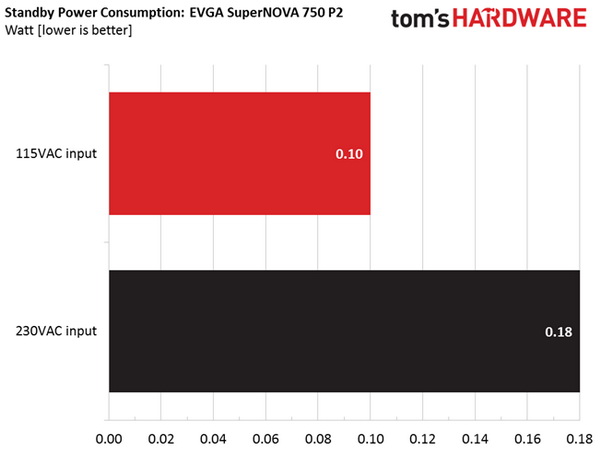
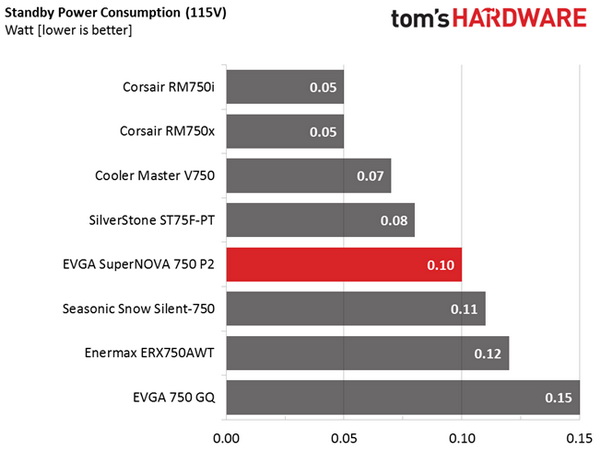
Vampire power is minimal.
Fan RPM, Delta Temperature And Output Noise
Our mixed noise testing is described in detail here.
The first chart below illustrates the cooling fan's speed (in RPM), and the delta between input and output temperature. The results were obtained at 36 °C (96.8 °F) to 49 °C (120.2 °F) ambient temperature.
The next chart shows the cooling fan's speed (again, in RPM) and output noise. We measured acoustics from one meter away, inside a small, custom-made anechoic chamber with internals completely covered in sound-proofing material (be quiet! Noise Absorber kit). Background noise inside the chamber was below 18 dB(A) during testing, and the results were obtained with the PSU operating at 36 °C (96.8 °F) to 49 °C (120.2 °F) ambient temperature.
The following graph illustrates the fan's output noise over the PSU's operating range. The same conditions of the above graph apply to our measurements, though the ambient temperature was between at 28 °C (82.4 °F) to 30 °C (86 °F).
The passive mode lasts quite a while, and even with the fan spinning, its noise doesn't exceed 36 dB(A) in any case. Overall, this is a quiet power supply, though if its fan had a lower start-up voltage (and consequently speed), the acoustics would look even better.
Current page: Efficiency, Temperature And Noise
Prev Page Load Regulation, Hold-Up Time And Inrush Current Next Page Cross-Load Tests And Infrared Images
Aris Mpitziopoulos is a contributing editor at Tom's Hardware, covering PSUs.
-
Nuckles_56 Thanks for the review Aris. I'd have to say that I'm very impressed with the performance of this unit, it is excellent. It is also nice to see that it has no issues with holdup times either.Reply -
theyeti87 It was the P2 650 review on Tom's that helped me decide on buying that unit. Same as this, just 100 watts less powerful. Extremely happy with the stability and quiet operation. Very reliable units!Reply -
AfiliaSaga I have their G2 750W superflower unit, fantastic performance couldn't be happier with it.Reply -
refillable Another great product from EVGA. I regret belittling EVGA with their early PSUs. I also mistakenly said, "I don't like that EVGA PSU"...Reply
With SuperFlower, they're known to bring greatness now. Anyone looking for "Good PSUs" should go straight to these units and buy them. Exceptional value with excellent performance. Sadly, they're still not available in my country. -
dstarr3 Reply18119171 said:Another great product from EVGA. I regret belittling EVGA with their early PSUs. I also mistakenly said, "I don't like that EVGA PSU"...
With SuperFlower, they're known to bring greatness now. Anyone looking for "Good PSUs" should go straight to these units and buy them. Exceptional value with excellent performance. Sadly, they're still not available in my country.
Right on. Unless you need significantly more or significantly less power, there's no reason to buy anything else.
